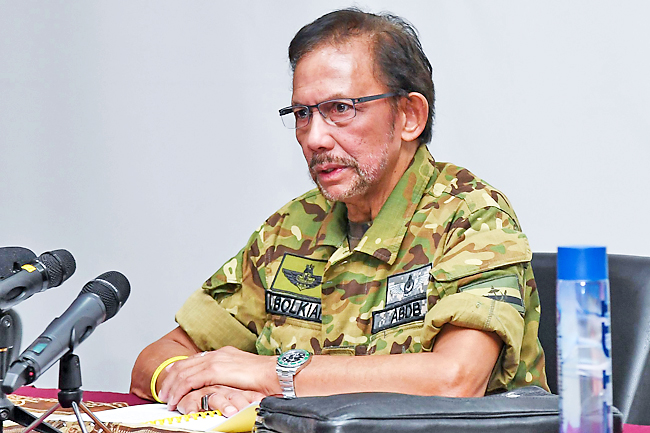Azlan Othman
His Majesty Sultan Haji Hassanal Bolkiah Mu’izzaddin Waddaulah ibni Al-Marhum Sultan Haji Omar ‘Ali Saifuddien Sa’adul Khairi Waddien, Sultan and Yang Di-Pertuan of Brunei Darussalam expressed his dismay at Politeknik Brunei’s (PB) inadequate and irregular policy, which only came to light in October last year.
In a titah delivered yesterday at an unscheduled visit to PB’s main campus at the Ong Sum Ping Condominium, as well as its Institute of Brunei Technical Education (IBTE) Business Campus in Gadong and IBTE School of Aviation in Berakas, His Majesty said, “It is highly regrettable to note that PB lacked a well-organised and adequate policy up to 2020.
“Naturally, an irregular policy will result in a weak administration, while PB is needed to provide educated and skilled human resources.
“One of these weaknesses is the collaboration between PB and Hengyi Industries Sdn Bhd. Following the company chairman’s tour of the PB campus and interaction with the teachers and students undergoing the Industrial Analysis Programme – which is a diploma programme between Hengyi Industries and PB – both parties reportedly agreed to further broaden cooperation by planning to establish a petrochemical school, which was expected to require more than 1,000 vacancies.
“However, it was said that the company grew sceptical and dismissive of local competency. Instead of hiring a local workforce, they hired their fellow citizens to fill vacant posts. If this is true, then it indicates a deficiency on the part of PB, which should be addressed.”
Earlier, His Majesty said, “PB has the vision to produce innovative graduates that are marketable, while its mission is to equip students with educational skills holistically. In the early days of its establishment, nine advanced diploma programmes were introduced in business, info-communication technology and science, as well as engineering.”
Clik here to view.

“In 2015, a transformation was made with the addition of more Level 5 Diploma programmes equivalent to the Higher National Diploma (HND). Since then, 21 academic programmes have been offered by four more schools under PB, namely the School of Business, the School of Information and Communication Technology, the School of Health Science and the School of Science and Engineering.
“Looking at its vision and mission, as well as the programmes on offer, there can be no doubt as to PB’s potency and as a source of pride. This is an outside perspective and it is hoped that what is seen from the outside corresponds to what is within.
“The concept of enhancing and building quality must exist at all times. But it should be done with caution instead of haste, such as PB’s introduction of the Level 5 Diploma programme (HND) in Petrochemical Engineering, when it is already known that PB still lacks a qualified teaching force and adequate facilities. Is this not questionable?
“Currently, PB has several schools offering various diploma programmes that are viewed as beneficial and meeting present needs. Among them is the School of Business, which offers diploma programmes in accounting and finance, business, entrepreneurship, human resources management, and marketing.
“School of Health Science, meanwhile, offers six diploma programmes including health sciences in nursing, paramedic and technology. The School of Science and Engineering also offers attractive diploma programmes for interior design and petroleum engineering.
“All of these programmers are relevant for fulfilling short- and long-term demands in the 21st century. Because of these programmes, PB gained prestige and witnessed a surge in the number of students, exceeding the capacity in the available buildings and facilities. Hence, the question of building a new campus to accommodate the four schools under PB should be considered.
“With an increase in the number of schools, it is inevitable for various issues to occur. But it is my hope that all will run smoothly, particularly for the students in their respective schools, so that they may gain discipline and noble values.
“At this stage, PB has produced plenty of alumni who underwent various programmes being proffered. I would like to know whether any assessments have been made regarding the workforce marketability of PB alumni who gained employment or were successful in setting up their own businesses. It is crucial that this should be defined as a benchmark of excellence or failure for PB.
“With regard to the IBTE, it was established to replace the duties of the Department of Technical Education, with the mission of producing highly skilled and marketable graduates. The rationale for its establishment was to restructure the technical education system to be more responsive and relevant to the nation’s needs.
“As a post-secondary institution, IBTE offers Higher National Technical Education Certificate (HNTec) and National Technical Education Certificate (NTec) courses, with seven clusters such as agrotechnology and applied sciences, maritime, business and financial services, hospitality and tourism services, energy and engineering, building technological services, electronics and information technology.
“IBTE provides the option, but not as a last resort, to continue education at post-secondary level. These courses being offered in various fields undoubtedly provide an opportunity in technical education, as opposed to an academic one, which is capable of supplying the nation with skilled workers.
“Challenges should not be overlooked in the face of current changes, such as the spread of information technology, as well as all forms of challenge. The facilities and buildings for the courses must be relevant to fulfil the job market.”